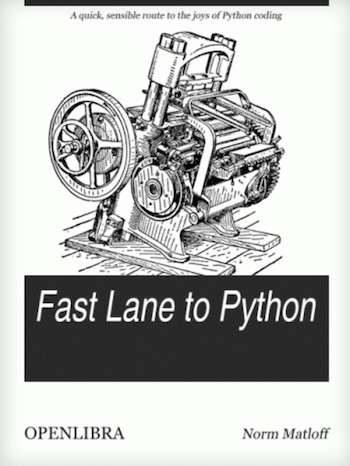
|
FreeComputerBooks.com
Links to Free Computer, Mathematics, Technical Books all over the World
|
|
- Title: Fast Lane to Python
- Author(s) Norm Matloff
- Publisher: University of California; eBook (Creative Commons Licensed)
- License(s): CC BY-ND 3.0 US
- Paperback: N/A
- eBook: PDF (173 pages)
- Language: English
- ISBN-10: N/A
- ISBN-13: N/A
- Share This:

|
This book aims to enable the reader to quickly acquire a Python foundation. The material particularly feel quite comfortable to anyone with background in an object-oriented programming (OOP) language such as C++ or Java.
Even if ones lack this background, they will still be able to read these sections, but will probably need to go through them more slowly than those who do know OOP. Some Linux knowledge would also be helpful, but it certainly is not required.
Python is used on Windows and Macintosh platforms too, not just Linux. So, most statements here made for the Linux context will also apply to Macs as well. The author acknowledged that programming is a personal, creative activity, so everyone has his/her own view.
It covers all essential Python knowledge. You can learn complete primary skills of Python fast and easily. The book includes practical examples for beginners and includes tests & answers for the college exam, the engineer certification exam, and the job interview exam.
About the Authors- Norm Matloff is an American professor of computer science at the University of California, Davis. He was formerly a statistics professor at that university, and thus approaches the subject matter here as both a statistician and computer scientist.
- Python Programming
- Computer Programming
- Data Structures and Algorithms
- Data Analysis and Data Mining
 Similar Books:
Similar Books:
-
 How To Code in Python 3 (Lisa Tagliaferri)
How To Code in Python 3 (Lisa Tagliaferri)
This book is designed to bring developers and others who are anxious to learn Python up to speed quickly. You will learn warts, gotchas, best practices and hints that have been gleaned through the years in days.
-
 Python for Everybody: Exploring Data in Python 3
Python for Everybody: Exploring Data in Python 3
This book is designed to introduce students to programming and software development through the lens of exploring data. You can think of the Python programming language as your tool to solve data problems that are beyond the capability of a spreadsheet.
-
 Automate the Boring Stuff with Python (Albert Sweigart)
Automate the Boring Stuff with Python (Albert Sweigart)
Learn how to use Python to write programs that do in minutes what would take you hours to do by hand - no prior programming experience required. You'll create Python programs that effortlessly perform useful and impressive feats of automation.
-
 Problem Solving with Algorithms/Data Structures using Python
Problem Solving with Algorithms/Data Structures using Python
This is a textbook about computer science. It is also about Python. However, there is much more. The tools and techniques that you learn here will be applied over and over as you continue your study of computer science.
-
 Fundamentals of Python Programming (Richard L. Halterman)
Fundamentals of Python Programming (Richard L. Halterman)
It focuses on introducing programming techniques and developing good habits. To that end, our approach avoids some of the more esoteric features of Python and concentrates on the programming basics that transfer directly to other imperative programming.
-
 O'Reilly® Think Python, 2nd Edition (Allen B. Downey)
O'Reilly® Think Python, 2nd Edition (Allen B. Downey)
This hands-on guide takes you through the Python programming language a step at a time, beginning with basic programming concepts before moving on to functions, recursion, data structures, and object-oriented design. 2nd edition updated for Python 3.
-
 Functional Programming in Python (David Mertz)
Functional Programming in Python (David Mertz)
It describes ways to avoid Python’s imperative-style flow control, the nuances of callable functions, how to work lazily with iterators, and the use of higher-order functions. He also lists several third-party Python libraries useful for functional programming.
-
 Python 3 Patterns, Recipes and Idioms (Bruce Eckel, et al)
Python 3 Patterns, Recipes and Idioms (Bruce Eckel, et al)
This book is aimed at more experienced Python programmers who are looking to deepen their understanding of the language and modern programming idioms. It focuses on some of the more advanced techniques used by libraries, frameworks, and applications.
-
 The Full Stack Python (Matt Makai)
The Full Stack Python (Matt Makai)
This book explains each Python web application stack layer and provides the best web resources for those topics. Throughout the book it takes an example open source Python web application through a complete deployment on a virtual private server.
-
 Architecture Patterns with Python (Harry Percival, et al.)
Architecture Patterns with Python (Harry Percival, et al.)
Enabling Test-Driven Development, Domain-Driven Design, and Event-Driven Microservices, it introduces proven architectural design patterns to help Python developers manage application complexity, and get the most value out of their test suites.





